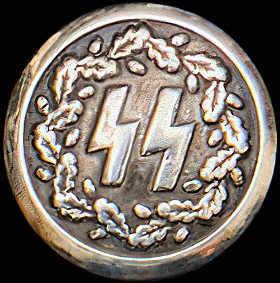Interview with Hans Braun, who worked in the SS Main Office before and during the war. Nuremberg, 1983.

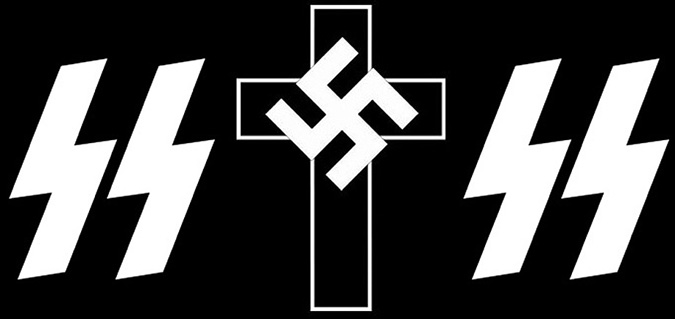
[The SS Main Office was the central command office of the Schutzstaffel (SS).]

Interview with Hans Braun, who worked in the SS Main Office before and during the war. Nuremberg, 1983.


[The SS Main Office was the central command office of the Schutzstaffel (SS).]

Hans: I was a very early party member, but I was not early enough to wear the golden party badge. However I was early enough to be called an 'Alter Kämpfer' [Old Fighter]. I was assigned to the ideological arm of the SS; we worked closely with Reichsführer-SS Himmler to make sure the SS was being built on his ideas.
It was a high honor in Germany to be in the SS, many royals and industrialists were members or sometimes given honorary ranks. You could say it was status symbol in the new Germany to wear the black uniform. If you wore the uniform, you were the best of the best in the Reich. Our standards were very high and before the war, very few were accepted who applied. You had to meet many requirements; height/weight, eyesight, good health, untainted blood, mental stability, and no police record.
[Above: NSDAP Party Badge (left) and the coveted Golden Party Badge.]
[Above: There were a few other badges issued with similar designs, such as the badge on the left, the
The D.V.G., standing for 'Deutscher Volksgenossen Bund' (German Fellow-Countrymen League), which was used by ethnic Germans from the Alsace-Lorraine region who fought for unification with Germany in the 1930s (occupied by France). The 'LOTHR.' stands for 'Lothringen', which is German for 'Lorraine'. The other badge 'Heim ins Reich' means 'Home in the Reich', which was used by ethnic Germans in lands stolen by the Versailles Treaty or lost previously, an example are Austria, Sudetenland, Memel, Western Poland and Danzig. Click to enlarge.]
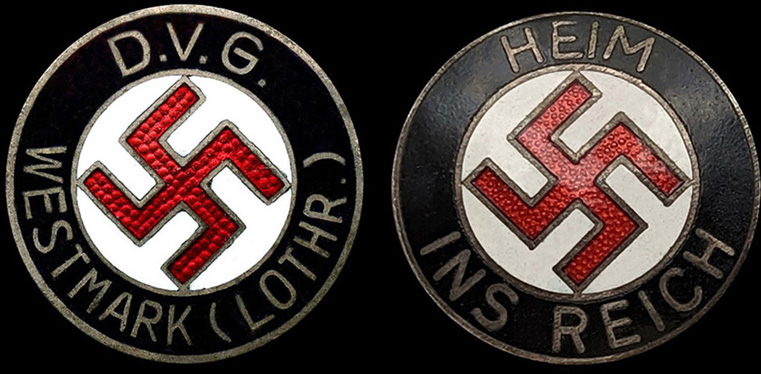
Hans: Yes, many times. I worked in the same building where Himmler worked before the war and would sometimes be in meetings where he would speak. Himmler was very matter-of-fact while at work, but later on in other settings he was very happy and always joking. He would have his daughter [Gudrun] with him on some occasions and she was very friendly, always asking us what we were doing and why, wanting to learn about our jobs. Himmler once spoke to me about my theology, as I was studying to be a minister. He had interesting ideas about religion and its role in the SS. It was an honest discussion.
I met the Führer once and saw him a few times speaking. He was very well-spoken and he spoke what the common German was wanting to be said. He told the truth, and made it plain and easy to understand. He was a blessing for the Reich, and I have nothing bad to say about him.
[Above: Himmler picking flowers with his wife and daughter.]
[Above: Himmler and his daughter Gudrun.]
Hans: By gosh no, that is something the communists and social democrats made up. I was nearing completion of seminary school when I was asked to join, largely due to my tie-in of Christianity with Nation Socialism. In the time right after the election in 1933, a small vocal minority in the Church attacked Hitler, due to his pointing out Jewish power. Most in the Church knew Hitler was right, and gave their full support. Proclamations were made defending National Socialism, and tying it to a religious basis.
The Vatican had skeptics, but they were brought in and ideas were shared, they left understanding this new idea was not a threat to them. I can say what we wanted to stop was the Judeo influence in the churches, something back then that was starting to get worse and worse. One tract we were shown from 1927, I believe, was that Jews were the sole owners of the Bible and God, and we 'gentiles' had to bend to their will. Everything the Church believed was actually tied to Jews, so we should let them do the teaching and tell us how the life of Christ was. We labeled these claims as false.
The German Christians were formed to counter these claims, the Church had done just fine in the last two thousand years without Jews, and thankfully many in Europe saw them for the fraud they were. They came to us only a few hundred years ago, and asked us to believe they were the ones always present in the lands of the Bible. Many of us dispute this. I will say Himmler sometimes sounded like he was against the Church, but he really was not. He sought a worldview that wove old Germanic ideas with those of the Church, and wanted nothing to do with the Jews.
Some SS men were part of denominations who were hostile to our beliefs and it was suggested they leave the Church, but this was the exception more than the rule. Most in the SS were Christian, and openly spoke of this. Therefore, it is untrue that men were forced out of the Church.
Why then were there no clergy in the SS, especially during the war?
Hans: I do not know where you get your information from, but again this is not true. While the SS did not specifically have priests, our men were openly able to go worship as they saw fit. It was more a separation of ideology that kept paid clergy out of the SS, but the Wehrmacht clergy aided the SS in the field. At home every church welcomed SS men and the local clergy were always available for weddings, christenings and funerals. Many times, they would come to the barracks to aid our men who needed spiritual help.
I can give you a personnel remembrance. In 1942 I was asked to join a delegation to tour the Soviet prisoner camps to study the idea of allowing the prisoners to aid us if they chose. We captured several hundred thousand prisoners by then, and the labor potential was hard to ignore, the key was how to still adhere to the conventions we signed.
Unlike Russia, Germany was a signor of many conventions to adhere to rules in wartime. We started in Poland, and went to a camp holding around two thousand, I believe. They looked well-fed, and some clergymen accompanied us. While touring this camp, the prisoners, who were all enlisted men with no political affiliations, asked for mass to be said. We were surprised as we were under the impression the Soviets forbade religion, unless it was Judaism.
Our translator said that was true, and these men had to worship in secret, or by themselves so the regime would not know. Mass was organized and blessing were given out, this was documented by the PK [Propagandakompanie] as it made for good morale. We spoke to the prisoners and asked if any would be willing to join us in fighting the Soviets, to our amazement all stepped forward. They were told we would report back to try to make this happen.
So I say this to dispel some untruths, first we treated Russian prisoners well. So well that many were released to work in the Reich on farms or in factories, with a German sponsor. Germans became alarmed by this and complained about so many foreigners allowed in the Reich. Wartime needs made it necessary to do this, and we had thousands willingly brought in from all over Europe.
So while the SS did not have paid clergy per se, they were always available to our men, no one was ever denied. On the battlefield the men could use Wehrmacht ones if they needed but many officers in the SS had training to deal with spiritual issues if they arose. Of course, there were men in the SS who would tell you this was an elite force with no need of spiritual guidance and that God did not exist, you will find those types in all armies.

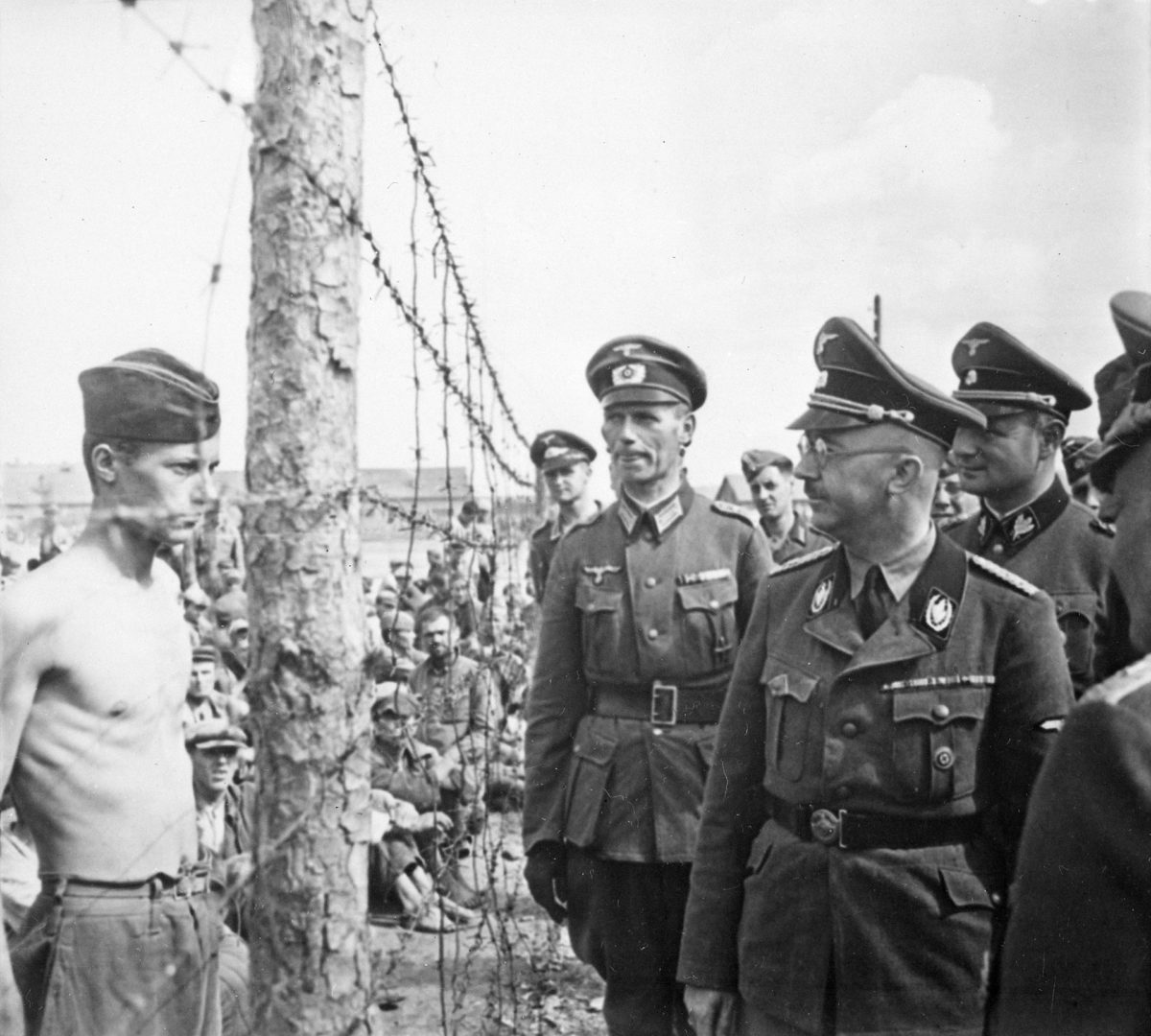
[Above: Reichsführer-SS Heinrich Himmler and his SS officers tour a P.O.W. camp on the Eastern Front. The officer second to the right of Himmler is his Chief of Staff, Karl Wolff. August 1941, Minsk, Belarus.]
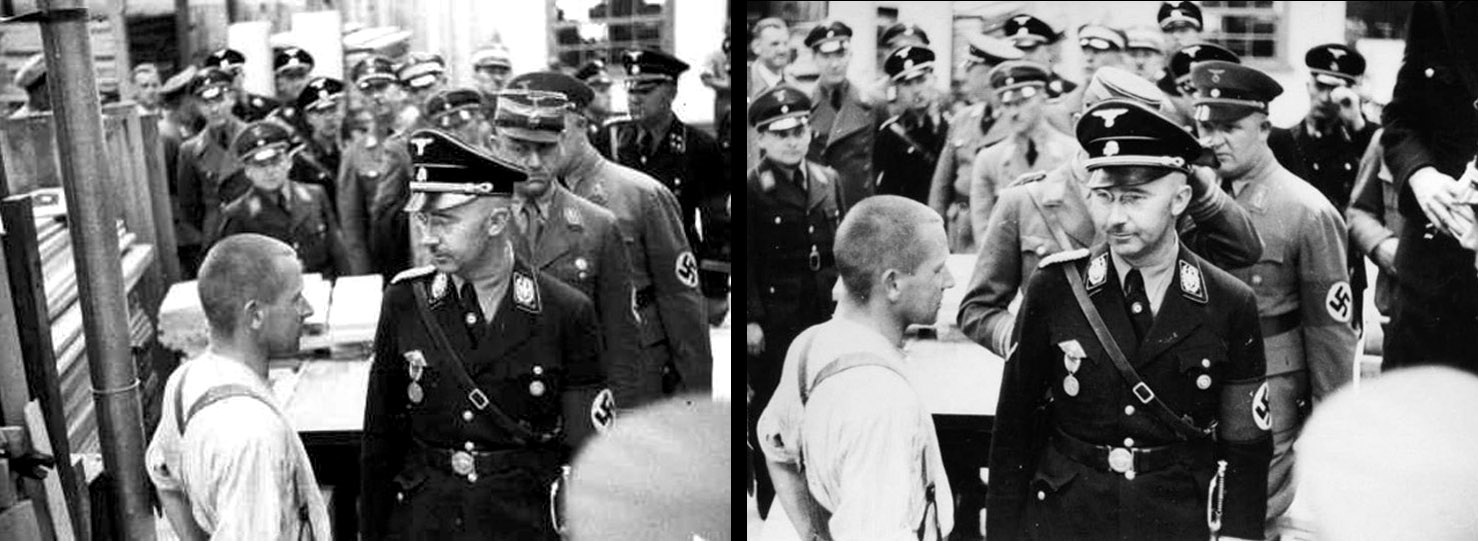
[Above: Himmler speaking with a foreign worker. Russian volunteers were by far the highest number of volunteers to help Germany, both civilians and soldiers.]
Did you ever see a concentration camp?
Hans: Yes, I was present in a couple of the small ones and I will tell you the prisoners were well-cared-for, and this was in 1943, when we were supposed to be killing them all. The most memorable one I can remember was a small work camp in Poland that housed around one thousand prisoners, mostly Jews who had been resettled from the Reich for suspected aid to our enemies. They were a sub-camp for a larger one and worked at providing timber for the Todt Organization.
I saw this camp on a day the men were very happy, a guard said it was because they got paid and could use their tokens for the nearby brothel at the end of their shift. This goes against all the stories told in the press today. What is said today about what went on in the camps I reject without a second thought.
What happened to you at the end of the war?
Hans: My office stayed in Berlin, having to move a couple of times due to the bombings, but by 1945 when the Soviets broke through the Oder Front an operation was put in effect to evacuate all government positions, and Himmler included us as well. I believe it was March that we started to leave to move further to the west and set up offices near Flensburg. On the way there, the going was very slow due to most every bridge being blown up.
My group was full of civilians and every town we came to was pretty full with refugees, so that we had to sometimes sleep in barns. The German people were exemplary in helping each other, even without having the means to do so. All the necessities for life were very scarce most everywhere we went. I think it was around Hamburg that English soldiers captured my group. I was wearing civilian clothes, but identified myself as a member of the SS and was promptly arrested and sent to a camp with other SS men.
It was here I started hearing about atrocities committed against the SS, like prisoners being shot. The English looked upon us as fanatics and killers, often accusing us of shooting prisoners and killing civilians. The Allies had very good propaganda working for them, they had many former Germans who were communists or Jews who helped foment the idea that the SS was a vanguard of a state killing machine, and sadly even some SS men went along with this to save themselves.
I was interrogated often, and was popular since I was one of the few in the SS administrative office. I always told what I knew and saw, but it was as if the Allies had a preformed idea of what we did, and that is all they wanted to hear. They would punch me if I said something different that did not agree with their idea. Many of the men were tortured by former Germans to get them to say things that were not true. Even women were brought in later and you could hear them screaming sometimes, then we never saw them again.
Millions of Germans were put in camps at war's end, anyone in the Party was charged with major offenses to peace, and told we would never see home again. I had a nasty Polish Jew who was over my block who would spit a lot and brag about the German women he was laying with at night because they needed food. This war brought out the worst in people; we could not have visitors, books, or regular food. It did test one's faith in what we believed. They would constantly show photos and films of the camps to try to convince us that we were part of this murder machine. They pieced together a very detailed story, but most of us knew this was war propaganda. An idea as good as National Socialism is not capable of the crimes our enemies accuse us of.

